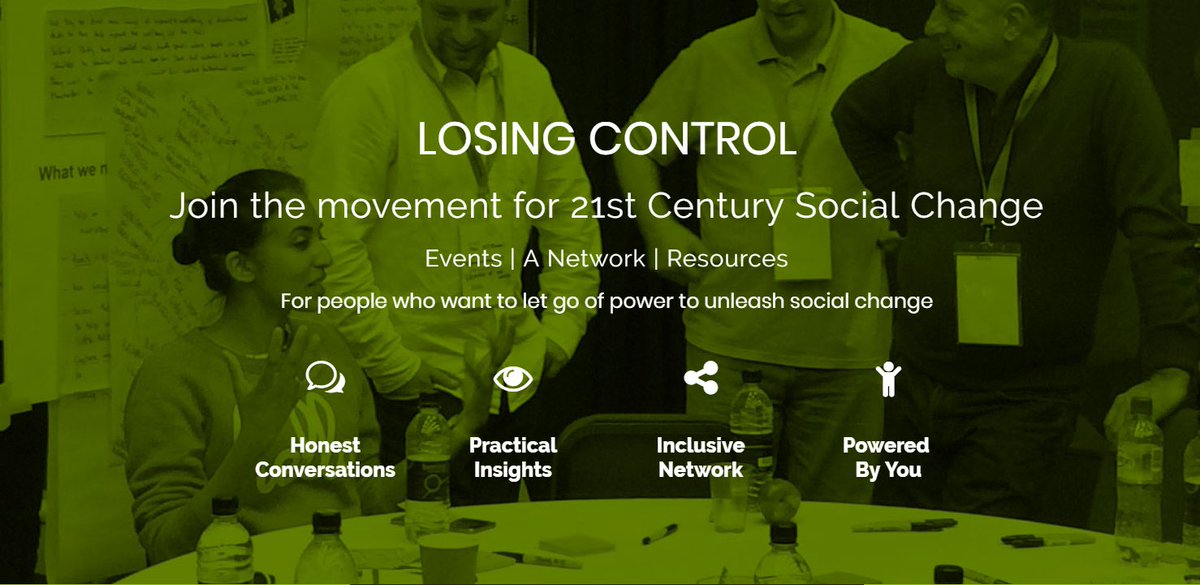The importance of losing control if we are to #ShiftThePower
Posted on 14 May 2019 Categories: Blog, Event reports
by Kim Soliman and Laura Ross Gakava
For two days in February we were welcomed to ‘Losing Control’, a gathering of like-minded folk seeking to connect, inspire, debate and conspire about how to lose control. As philanthropy advisers, we believe that people must have the power and dignity to be in control of their own destiny, and we felt a sense of excitement and anticipation about what was to come. Questions abounded … Who else was ready to lose control? And who indeed was already doing so? What could we learn? What could we offer? How do we move forward together, in solidarity, to be the change we want to see?
The event attracted people from a myriad of organisations and communities from around the UK who seemed curious and committed to doing things differently. It was a great starting place in bringing people together to make connections, build relationships, and begin to create a shared vision to #ShiftThePower. From the outset the energy was high and a buzz of enthusiasm filled the room. The programme of sessions, grouped under the themes Help Me, Teach Me, Talk to Me, Calm Me, offered interesting perspectives and thought-provoking ideas that invited further discussion. Individuals and groups shared stories about their communities, the challenges they faced, and the pathways they were taking to effect positive social and economic change. It was these particular experiences and reflections told by those with lived experience – the change agents – that were the most inspiring and refreshing.
The event was hosted in a Quaker meeting house, a thoughtful choice of venue. The underlying Quaker ethos of putting values into practice and acting together for the common good seemed never far away. Unfortunately, the meetings and sessions often followed a very traditional format – presentation and then discussion, structured and controlled. Consequently certain important topics could not be raised and there was little room for participants to find their own creative ways of doing things. If we are seeking to be a community working together for a common purpose, at the heart of this are people, relationships and trust. Perhaps there needed be a re-focus on this to enable a more open environment to emerge in which difficult questions could be asked. In not fully engaging the greatest assets in the room, an important opportunity to lose control was missed from the off.
Better facilitation could have encouraged people to reflect on some key and perhaps uncomfortable issues – particularly around their own power: how much do they have? What are its benefits and drawbacks? Can they give any of it away and to whom? None of this was explicitly acknowledged or discussed either in the plenary sessions or at any of the individual sessions that we attended. People were invited to make comments but the conversation seemed limited. More could have been done to challenge how we all may unintentionally reinforce the structures of the systems that we seek to challenge. Encouraging self-reflection by ‘holding up the mirror’ might have been useful in nudging those present to consider what changes we (individually and collectively) need to make in an effort to disrupt ‘business as usual’.
Reflecting on our own experience in the world of philanthropic grantmaking, there are a number of practices that reinforce existing power structures. An example of this is imposing restrictive conditions on grants or not allowing organisations to make decisions without the grantmaker’s prior consent. If we are serious about people having the power and dignity to be in control of their own destiny, then we have to acknowledge these power structures and find ways to change them through losing control.
Like many others, we are in the midst of exploring how best to navigate the way forward to create long-lasting and structural change. Hearing about the different approaches that individuals, groups and communities are taking to do this themselves provided a great learning opportunity. How we now connect and come together to build a wider, more cohesive movement is still not entirely clear. However, there is comfort and hope that the growing will, passion and energy developing across different and diverse sectors can build the momentum needed to achieve this.
Kim Soliman and Laura Ross Gakava are philanthropy advisers for a private trust.
Posted on 14 May 2019 Categories: Blog, Event reports

